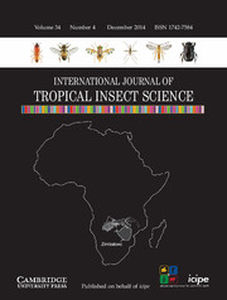No CrossRef data available.
Article contents
A model for a regional collaborative training programme in the insect sciences
Published online by Cambridge University Press: 19 September 2011
Abstract
Developing countries lack the indigenous scientists necessary to achieve a critical mass of manpower for the effective implementation of research and development policies. The need to train research scientists in the insect sciences is discussed and it is concluded that to provide training on relevant topics, given in the appropriate teaching and learning environment, more training must be available in developing countries. The resources for teaching and research in these countries are inadequate, but although they are scattered they are not absent. It is proposed that regional collaborative training programmes will combine the facilities of universities, for their academic tradition and for teaching, with those of research centres, for research and supervision. The structure and experiences of the African Regional Postgraduate Programme in Insect Science (ARPPIS) are presented as a model for a regional graduate training programme in developing countries. ARPPIS is a collaborative venture between 12 African universities and the International Centre of Insect Physiology and Ecology, leading to the award of the Ph.D. degree.
Résumé
Le manque de cadres scientifiques locaux dans les pays en voie de développement est un handicap sérieux pour l'implantation de la recherche et de la politique scientifique dans ces pays. Le besoin de former des entomologistes est examiné en détail et il est conclu qui'une formation sur les sujets utiles, donnée sous forme d'enseignement doit être disponible dans les pays en voie de développement. Dans ces pays, les ressources allouées à la recherche et à l'enseignement quoique présentes sont malgré tout insuffisantes. Il est suggeré que la collaboration régionale en matière de formation des cadres doit combiner les facilités académique qu'offrent nos universités et les infrastructures scientifiques présentes dans des centres de recherche. La structure du Programme Régional Africain de formation Postuniversitaire en Entomologie (ARPPIS) et son expérience sont présentées comme “modèle” pour un programme de formation dans les pays en développement. Le Programme Régional African de formation Postuniversitaire en Entomologie (ARPPIS) est un project de formation conduisant à l'acquisition d'un diplôme de doctorat en Entomologie. Il groupe en son sein 12 Universités Africaines et le Centre International pour la Physiologie et l'Ecologie des Insectes (ICIPE).
Keywords
- Type
- Symposium XII: Training in Tropical Entomology
- Information
- International Journal of Tropical Insect Science , Volume 8 , Issue 4-5-6: Recent Advances in Research on Tropical Entomology , December 1987 , pp. 943 - 949
- Copyright
- Copyright © ICIPE 1987


